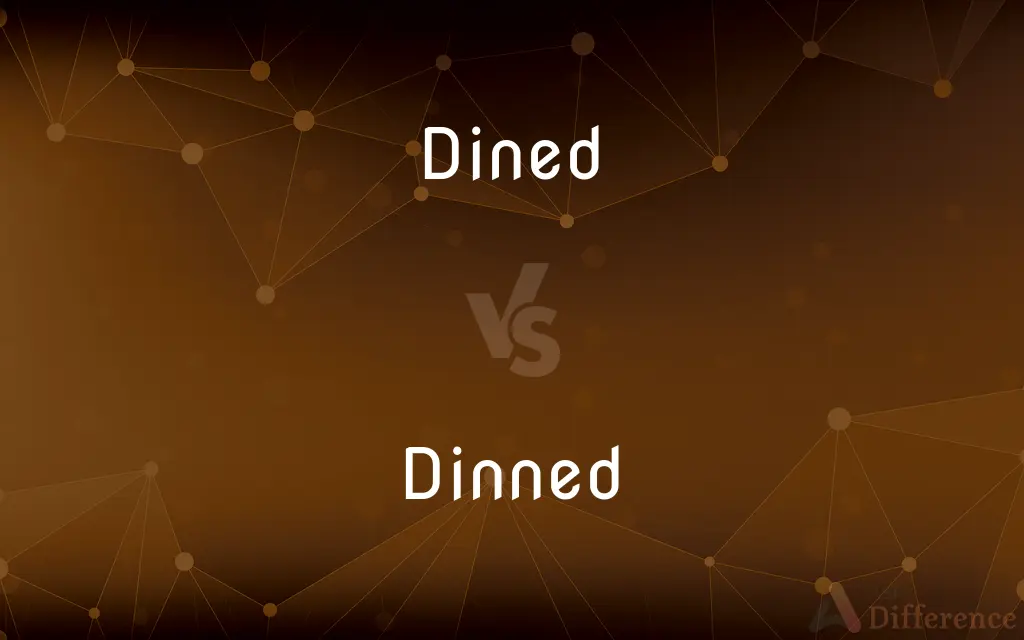Dined vs. Dinned — What's the Difference?
By Tayyaba Rehman — Updated on September 26, 2023
"Dined" refers to eating a meal, especially dinner. "Dinned" means to make a loud, prolonged noise. While one pertains to eating, the other is about sound.

Difference Between Dined and Dinned
Table of Contents
ADVERTISEMENT
Key Differences
"Dined" and "Dinned" are two verbs that, despite a single letter's difference, have distinct meanings. "Dined" is an action closely associated with eating, especially relating to a significant meal like dinner. For instance, one might have "dined" at a fancy restaurant last night. On the contrary, "Dinned" has nothing to do with food. Instead, it encapsulates the act of making a loud, continuous noise.
Exploring "Dined" further, the term is often used in sophisticated contexts. It can represent not just the act of eating, but doing so in a mannered or formal setting. If someone mentions they "dined" with the mayor, it implies a certain level of formality and occasion. In stark contrast, "Dinned" draws images of noise, often overwhelming and persistent. It can describe the cacophony in busy streets or the relentless ringing of an alarm.
Moreover, "Dined" has an air of enjoyment and leisure, suggesting a pleasant experience partaking a meal. It's a word you'd expect in narratives of lavish feasts or intimate dinner dates. "Dinned," meanwhile, leans towards annoyance or disturbance, given its association with loud, often intrusive noises.
In essence, while "Dined" takes one to aromatic kitchens and candlelit tables, "Dinned" pulls into the realm of blaring horns and ceaseless chatter. Their applications are entirely different, bound together only by their phonetic similarity.
Comparison Chart
Primary Meaning
To eat, especially dinner.
To make a loud, continuous noise.
ADVERTISEMENT
Associated Activity
Consuming food.
Producing or being subject to noise.
Synonyms
Feast, sup.
Blare, resound.
Connotations
Often suggests a formal or enjoyable meal.
Implies overwhelming or persistent noise.
Grammatical Role
Verb, past tense of "dine".
Verb, past tense of "din".
Compare with Definitions
Dined
To partake in food at a specific place or event.
They dined at the seaside cafe.
Dinned
To be subjected to a cacophony.
They were dinned by the traffic noise during rush hour.
Dined
To be a guest at a meal.
He dined with the ambassador last week.
Dinned
To make a loud, persistent noise.
The construction work dinned in our ears all morning.
Dined
To eat a meal, especially dinner.
We dined at the new Italian restaurant downtown.
Dinned
To bombard with loud noise or information.
The salesman dinned the product features into the client's ears.
Dined
To feast or eat sumptuously.
The king and queen dined in grandeur.
Dinned
To ring loudly and continuously.
The alarm clock dinned until she finally turned it off.
Dined
To consume a meal with specific people or in specific company.
She dined with her family on Sundays.
Dinned
To cause to be learned by repetition.
The teacher dinned the formula into the students' minds.
Dined
To have dinner.
Dinned
A jumble of loud, usually discordant sounds.
Dined
To give dinner to; entertain at dinner
Wined and dined the visiting senators.
Dinned
To stun with deafening noise.
Dined
Simple past tense and past participle of dine
Dinned
To instill by wearying repetition
Dinned the Latin conjugations into the students' heads.
Dinned
To make a loud noise.
Dinned
Simple past tense and past participle of din
Common Curiosities
Is "Dinned" only used in negative contexts?
Often, given its association with intrusive noise, but it's context-dependent.
Can "Dined" be used for meals other than dinner?
While closely linked with dinner, "Dined" can be used for other significant meals too.
Are "Dined" and "Dinned" synonyms?
No, "Dined" relates to eating, while "Dinned" pertains to loud noise.
What does "Dinned" suggest in terms of sound?
"Dinned" indicates a loud, persistent, often annoying sound.
Can "Dined" suggest a level of formality in a meal?
Yes, "Dined" can imply a formal or significant dining experience.
Share Your Discovery

Previous Comparison
Tablespoon vs. Spoonful
Next Comparison
Ohm vs. SiemensAuthor Spotlight
Written by
Tayyaba RehmanTayyaba Rehman is a distinguished writer, currently serving as a primary contributor to askdifference.com. As a researcher in semantics and etymology, Tayyaba's passion for the complexity of languages and their distinctions has found a perfect home on the platform. Tayyaba delves into the intricacies of language, distinguishing between commonly confused words and phrases, thereby providing clarity for readers worldwide.













































